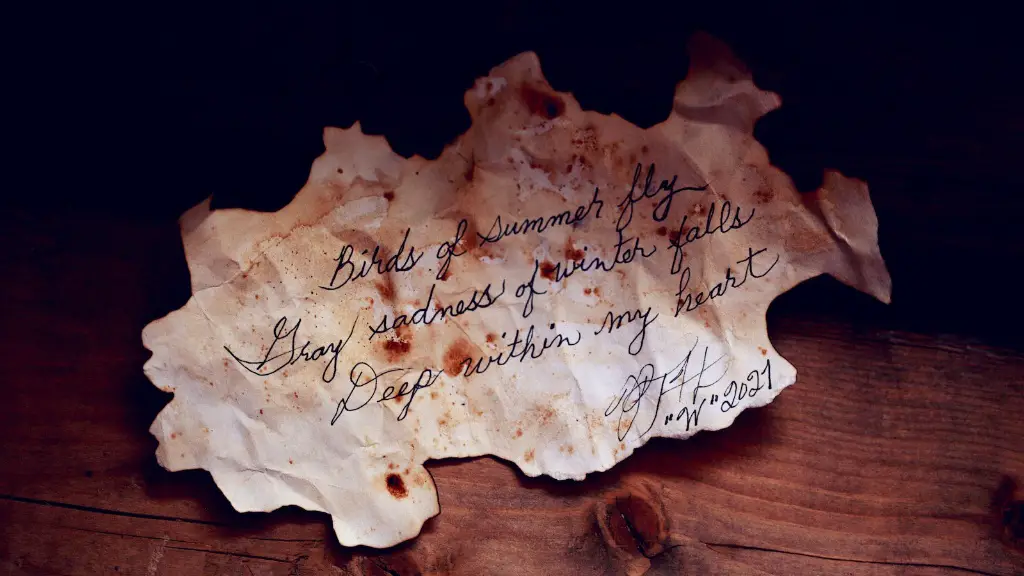Robert Frost is one of America’s preeminent poets. He is renowned for his depictions of rural life and his true-to-life dialogue and metaphors. Frost was born in San Francisco, California in 1874. He attended Dartmouth College and Harvard University, though he never received a degree from either institution. He worked as a teacher and later a newspaper editor for nearly a decade before becoming a full-time poet.
Throughout his life, Frost wrote several collections of poetry, which often focused on the realities of rural living and the beauty of nature. His style was known for its simple language and ironic themes, and his works included “The Road Not Taken,” “After Apple Picking,” and “Mending Wall.” Frost was a four-time Pulitzer Prize winner, and his works are still widely read today.
Frost was known for his dry wit and down-to-earth view of life. His poetry is often set in New England, where he spent a majority of his life. He used everyday speech and plain language in a way that made his works some of the most popular of the 20th century. In fact, many of his works are now taught in school curriculums.
Frost died in January 1963 at the age of 88. He was buried in the Old Bennington Cemetery in Vermont, near his beloved family farm in Derry, New Hampshire. To this day, Robert Frost continues to be one of the country’s most popular poets, and his works remain an integral part of American culture.
In addition to his poetry, Frost also wrote several plays and prose works. He was an advocate of environmentalism, and was known for his support of the civil rights movement. He was honored for his contributions to American literature, and received 38 honorary degrees from universities throughout the country.
History
Robert Frost was born in San Francisco on March 26, 1874. He was the son of William Prescott Frost Jr. and Isabelle Moodie, both of whom were educators. Frost was the oldest of their four children. His father was an editor of The San Francisco Evening Bulletin and became a hunter after moving his family to Massachusetts. Tragically, Frost’s father died of tuberculosis when he was 11 years old, leaving the family in financial hardship.
Frost enrolled in Dartmouth College in Hanover, New Hampshire from 1892 to 1894. He later transferred to Harvard University, but was never able to complete his degree due to financial constraints. In 1895, Frost married Elinor Miriam White and the couple moved to Lawrence, Massachusetts, where they had six children. After, Frost worked as a teacher and later became the editor of The Lawrence Sentinel before turning to literature full-time.
In 1912, Frost and his family moved to England, where he became acquainted with writers such as Edward Thomas, Robert Graves, and Rupert Brooke. One of Frost’s most famous works, “The Road Not Taken,” was written during his time in England. When World War I broke out, Frost returned to the United States and settled in Franconia, New Hampshire. He continued to write and explore themes associated with rural life in New England.
Frost was a popular public speaker throughout his life. In 1932, he was invited to speak at the inauguration of United States President Franklin D. Roosevelt. He was also awarded four Pulitzer Prizes for his work, including the first in 1924 for his verses New Hampshire and the last in 1943 for his collection A Witness Tree. He was also awarded forty honorary degrees and was the recipient of the Congressional Gold Medal in 1960, awarded jointly to him and his wife.
Frost spent the later years of his life in South Shaftsbury, Vermont, where he wrote poems and entertained family and friends. He continued to write until his death in January 1963. He was buried in the Old Bennington Cemetery in Vermont, near his beloved family farm in Derry, New Hampshire. His writings remain popular today, and his works are still widely read and studied.
Poetry and Impact
Frost is best-known for his poetry, which focuses on rural life and nature. He often used everyday speech in his works, and his writing was known for its simplicity and irony. Additionally, Frost often borrowed from classical and personal sources for his poems, using elements from his own words and experiences. His works include some of the most beloved poems in American literature, including “The Road Not Taken,” “Stopping by Woods on a Snowy Evening,” and “Birches.”
In addition to his accolades for his work, Frost was well-known for his love of nature and was an advocate of conservationism. He owned a farm in South Shaftsbury and was a frequent guest lecturer at Dartmouth College. Frost also encouraged people to explore their local surroundings rather than simply traveling to exotic locations. His works often explore the complementarity of human relationships with nature.
Frost’s works have inspired generations of writers and poets, and they remain important and relevant today. His works are studied in classrooms around the world, and many are still set to music and performed as song lyrics. Frost’s works explore timeless themes such as authority, freedom, nature, and mortality, making them relevant to readers today.
Legacy
Frost left behind a legacy in both poetry and in life. His works remain an important part of American culture and his influence on American literature is undeniable. He was posthumously awarded a special Pulitzer Prize in 2008 in recognition of his body of work. He was also the recipient of forty honorary degrees and two special one-time Congressional Gold Medals, awarded for his service to American literature.
Frost was also remembered for his sense of humor, wit, and dry one-liners. His passion for nature and rural living earned him an enormous following, and his works continue to be studied and appreciated to this day. His poems have been adapted into musicals, television shows, and films, and are taught in schools across America.
Frost’s works remain timeless and relevant to readers today. His simple language, ironic humor, and complex metaphors continue to make his works some of the most-read in American literature. Generations of aspiring writers have been influenced by Frost’s unique style and his works continue to touch readers to this day.
Influences
Frost was deeply influenced by the work of Ralph Waldo Emerson and Walt Whitman. He often used Emerson’s themes of nature and transcendentalism in his work, which was focused on the natural world and rural life. Frost was also inspired by the writing of Robert Louis Stevenson, Robert Burns, and English poets John Masefield and Thomas Hardy. His work was influenced by the English Romantic poets and his New England upbringing.
Frost was also heavily influenced by his environment and his family. His poem “Birches,” for example, is a homage to his father. His works often explore the complex relationships between humans and nature, human relationships, and the tyranny of social expectations. His works are poignant and lasting explorations of the human experience, and remain relevant to this day.
Frost’s works have been adapted into plays, films, songs, and musicals due to their widespread popularity and their timeless themes. The themes of Frost’s work often focus on a shared human experience, and have earned him a devoted readership and a lasting place in American literature.
Fun Facts
Frost was an avid outdoorsman and often went on long walks in the woods alone. During one of his walks, an owl flew into his coat, which prompted him to write his famous poem “Stopping by Woods on a Snowy Evening.”
Frost is known for his dry wit and humorous one-liners. He once said, “A diplomat is a man who always remembers a woman’s birthday but never remembers her age.”
When Frost was in college, he worked as a janitor, groundskeeper, and electrician. He was also an associate editor at the Lawrence Sentinel from 1897 to 1900.
Frost was a passionate chess player and his works often reference the game. He often played chess with his closest literary friends and fellow poets.
In an effort to promote conservationism, Frost was named an honorary forest ranger by the U.S. Forest Service in 1960.





